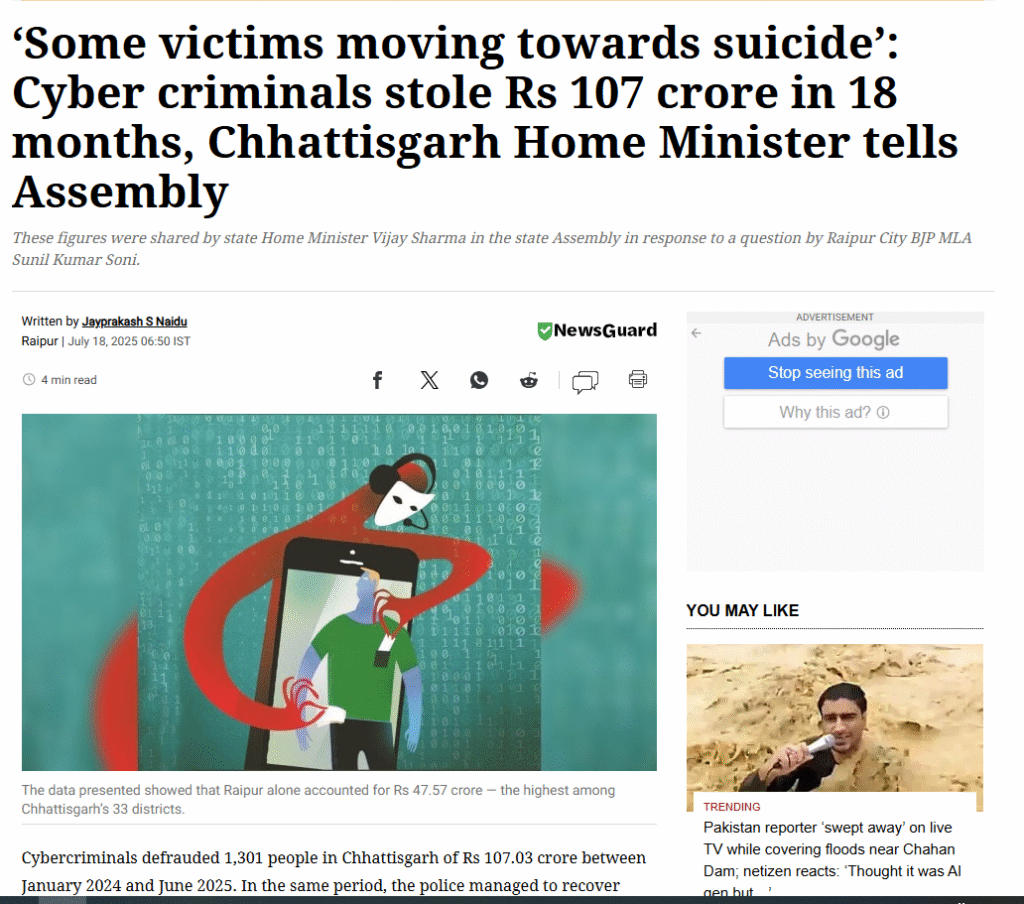These figures were shared by state Home Minister Vijay Sharma in the state Assembly in response to a question by Raipur City BJP MLA Sunil Kumar Soni.

Cybercriminals defrauded 1,301 people in Chhattisgarh of Rs 107.03 crore between January 2024 and June 2025. In the same period, the police managed to recover only Rs 3.69 crore (3.36%) across 107 cases.
The data presented showed that Raipur alone accounted for Rs 47.57 crore — the highest among Chhattisgarh’s 33 districts. It was followed by Bilaspur with Rs 10.20 crore, and Durg with Rs 9.65 crore. “I believe the amount in Raipur is more than Rs 47.57 crore. Is the police competent to handle cyber crimes? Also, you have said that bank officials are also involved in such crimes — so has any action been taken on them?” Soni asked.
Detailing the steps taken by the government, the Home department said: “For the prevention of cyber crimes, one state cyber police station and five range cyber police stations are operating at the range level. Cyber cells are also operating at the district level and approval for cyber police stations has been received in some districts.”
It added that a cyber forensic lab equipped with modern tools is functional at the police headquarters in Raipur for testing digital evidence collected during investigations.
Cybercrime Awareness: Make Do and Don’t
Based on Chhattisgarh’s rising online fraud cases and official warnings from the state Home Minister
MAKE DO
(Protect yourself and others from digital fraud)
- Do stay alert for emotional manipulation
Many scams use fear, urgency, or emotional blackmail (like fake kidnapping or sextortion). Stay calm and assess logically. - Do verify all financial requests—even from known contacts
Hackers often impersonate friends or family. Always double-check via a second method (like calling). - Do freeze compromised accounts immediately
Contact your bank, mobile service provider, or e-wallet support ASAP if you suspect fraud. - Do spread awareness in your community
Organize workshops or sessions at schools, colleges, or RWAs (Resident Welfare Associations) to educate the public. - Do monitor elderly family members’ devices
Older adults are frequent targets. Help them set up security features and teach them about scams. - Do keep digital proof
Screenshots, messages, call recordings—everything can be vital for police or cybercrime units to act swiftly. - Do check URLs carefully
Many scams use fake websites that mimic official ones. Look for typos or suspicious domains.
DON’T
(Avoid these mistakes that make you vulnerable)
- Don’t panic if someone threatens you online
Scammers rely on fear to extract money. Stay calm and consult the police or cyber helpline. - Don’t respond to ‘too good to be true’ offers
Job offers, lottery winnings, and investment schemes from unknown sources are almost always frauds. - Don’t allow remote access to your devices
Apps like AnyDesk, TeamViewer, or QuickSupport should never be given to unknown or unverified callers. - Don’t use untrusted apps or websites
Only download from official app stores (Google Play, Apple App Store). Avoid apps from unknown sources. - Don’t delay reporting mental distress
Cyber fraud victims may face shame or depression. If you’re struggling emotionally, talk to someone or call a mental health helpline. - Don’t forward unverified messages or job posts
Many scams spread through mass WhatsApp forwards. Stop the chain by verifying first. - Don’t assume it won’t happen to you
Cybercriminals target everyone. Even educated professionals, students, and homemakers have been victims.
- Cyber Crime Reporting Portal: cybercrime.gov.in